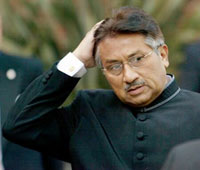Pervez Musharraf finalizes caretaker government
Pakistani President Pervez Musharraf and his aides were finalizing a caretaker government Thursday, while his two opposition rivals opened talks on forming an alliance against him.

Nov. 15 marks the end of the current Parliament's five-year term. Musharraf's concurrent presidential mandate also expires Thursday, though he has extended it by calling a state of emergency that has cast Pakistan into a deep political crisis.
The caretaker administration will be charged with guiding Pakistan toward parliamentary elections to be held by Jan. 9.
A senior Cabinet minister said that Mohammedmian Soomro, chairman of the upper house of Parliament, was a strong candidate for the key position of caretaker prime minister.
"I see him as the caretaker prime minister, but any final decision will be announced by President Musharraf," Railways Minister Sheikh Rashid Ahmad told The Associated Press.
Pakistani media say that a retired general serving as ambassador to Turkey, Iftikhar Hussein Shah, and a former central bank governor, Ishrat Hussain, are also in the running.
State television said an announcement was expected later Thursday.
The vote is supposed to complete the restoration of democratic rule in Pakistan, eight years after Musharraf seized power in a bloodless coup.
However, both opposition parties and Western governments say that the vote cannot be considered free and fair unless the general quickly lifts the emergency, which many in Pakistan are equating with martial law.
Musharraf seized extraordinary powers on Nov. 3 and used them to detain thousands of opposition and human rights activists, purge the senior judiciary and black out independent TV news channels.
The United States still counts Musharraf as a stalwart ally in its war on terror. But it wants him to share power with other moderates, such as former Prime Minister Benazir Bhutto, to harness more political support for Pakistan's struggle against Islamic extremists while also ending military rule.
Musharraf says the main purpose of the emergency is to protect the effort against extremism from interfering judges and political turbulence.
But the crackdown on dissent has triggered a rapid downward spiral in his relations with Bhutto, a pro-Western secularist like himself but also a fierce political competitor.
Bhutto called Tuesday for Musharraf to leave power and joined other opposition parties in threatening to boycott the election.
She spoke by telephone Wednesday with Nawaz Sharif, whose government was ousted in Musharraf's coup, to discuss setting up an opposition coalition, a spokesman for her Pakistan People's Party said.
"She talked about the need for cooperation by all political parties on a one-point agenda aimed at the restoration of the constitution, lifting of the emergency and holding free and fair elections," said spokesman Farhatullah Babar.
Babar said no decisions had been made.
Authorities on Tuesday placed Bhutto under house arrest for the second time in a week to prevent her from leading anti-Musharraf rallies.
Subscribe to Pravda.Ru Telegram channel, Facebook, RSS!





